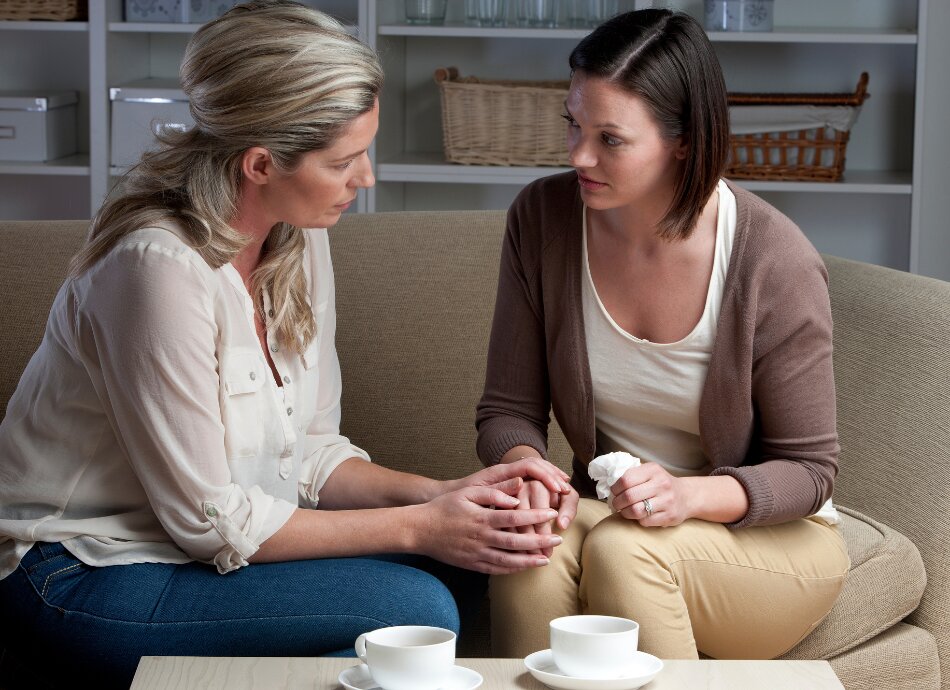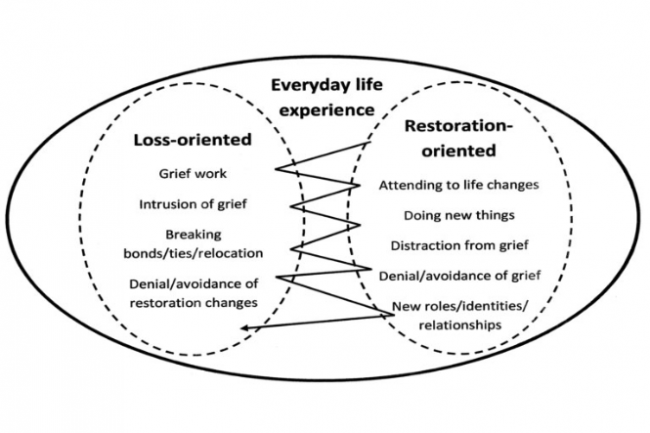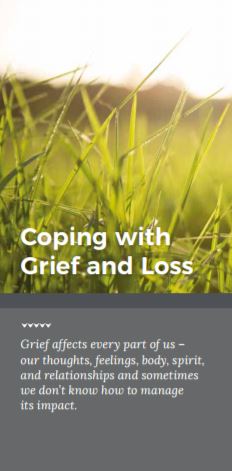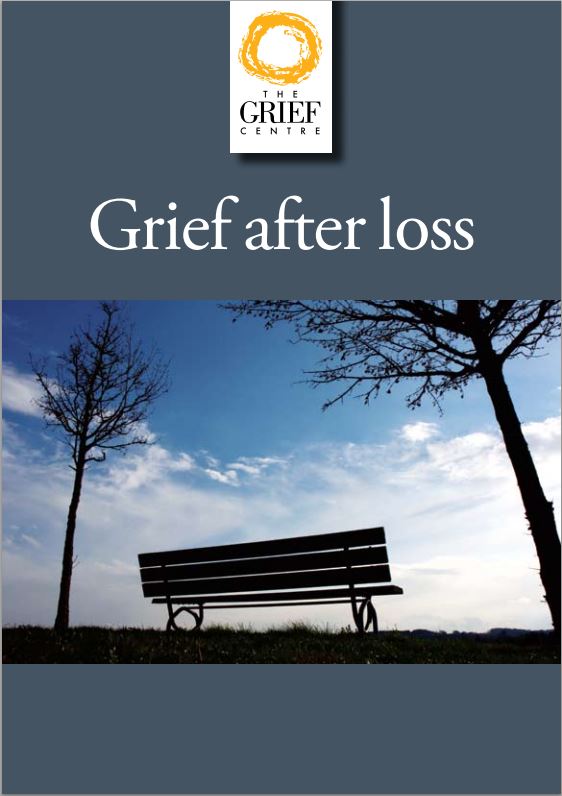- Grief can be very painful. You may feel a range of emotions such as sadness, shock, anger and distress. There can be times when you feel numb or disconnected from the loss you experienced and, on such occasions, you may feel guilty of “not grieving enough”. A sense of guilt can also pop up if you enjoyed some good and happy moments.
- There is no correct way to grieve or time it should take – your grief is unique to you. Ways of grieving may also vary in different cultures and religions. Be kind to yourself. Acknowledge how you are feeling and allow yourself time and rest.
- It helps to talk to a friend or a professional, or express how you are feeling in some other ways, eg, creating an artwork or journaling.
- Numbing out from your feelings with alcohol or drugs doesn’t help and may lead to depression. But it can help to take breaks from your grief to stop it becoming overwhelming by doing something distracting, such as catching up with a friend, watching a movie, engaging in physical exercise (eg, gardening, a work out or dancing) or reading a good book.
- If over time your feelings of sadness and grief change into feelings of hopelessness, worthlessness, and loss of interest in life, talk to your doctor. Your grief may have turned into depression.
Low or no data? Visit zero.govt.nz, scroll down the page then click on our logo to return to our site and browse for free.
Grief and loss
Key points about grief and loss
- Grief is the natural reaction to losing someone or something that you love or value. It's a normal part of life and includes emotional, physical and mental responses.
- You may be experiencing grief from loss of your own hauora and wellbeing or loss of a loved one or your employment. You may also have lost your sense of security and feel life is less predictable.
- Grief can be very painful and the experience is different for everyone, there's no right way to grieve.
- If you find your grief makes you feel hopeless or worthless, talk to a healthcare provider and get some support.

Grief is the natural response to the loss of something you value and find important. This may be loss of:
- people – due to death or moving away
- relationships – due to breaking up or divorce, or other changes for the worse
- a location – through changing schools, moving houses, cities or countries
- your sense of place – from losing your spot in a sports team or being made redundant in your job
- pets – losing a long-term companion can be traumatic and sad
- good health – due to accident or sickness
- things you own – by mistake or from theft
- an old identity – this may be due to getting married, becoming a parent, retiring
- as you age, a sense of loss or regret regarding things in your past and your life.
Everyone experiences grief differently, but common feelings include the following:
- Shock/disbelief: You might feel in denial, as if you’ve woken from a nightmare. You may feel jaded, disoriented, emotionless or vacant. It may take a while to come to terms with reality. Sometimes an event can be so terrible you won’t want to accept it as reality.
- Sadness/wanting to cry: Crying can help to release sadness, and it’s better to do this than suppressing your feelings. After crying you tend to feel clearer and relieved.
- Anger/blame: You might feel angry. You may want to blame a specific person for the event. If you have lost someone, you may feel angry at them for leaving you.
- Guilt: In some situations, you might feel guilty and feel that you caused the event. Or you may feel guilty about feelings of anger, blame or relief you experience.
- Fear/anxiety: After a significant loss you may feel anxious, helpless, or insecure. If you have lost a loved one you may worry about how you can manage on your own without them.
- Yearning: There is a space in your life where that thing or person used to be. You know that you can’t have things how they were again, but you dream about it, discuss with friends and family, and think about it very often.
- Out of control/overwhelmed: You might not be able to stop crying and have tears want to escape without warning. This may make you feel overwhelmed or out of control, but if you go with the crying, you’ll find that it passes.
- Physical symptoms: Grieving happens at a physical level as well as an emotional one. You might feel unwell overall, or have stomach pains or headaches, or you may become more susceptible to colds for a period.
- Thoughts: You may feel confused or bewildered, not being able to make sense of it, seeking explanations, trying to rationalise it.
- Changes to eating or sleeping: You may have an appetite shift, eating less or more, or find it hard to sleep and feel tired and run down.
Grief has been described as a series of stages (denial, anger, depression, bargaining and acceptance) that you go through. But this model assumes that everyone who is grieving experiences all 5 stages in the same order. However, for most people grief is not experienced in stages and some people may never go through any of them or keep shifting back and forth between different stages. The ‘Dual Process Model’ of grief suggests we can oscillate between loss oriented (past) and restoration oriented (future) feelings and thinking for a while.

Image credit: The Dual Process Model of Coping with Bereavement Stroebe & Schut 1999, https://creativecommons.org/licenses/by-nc/4.0/
In Aotearoa New Zealand, we have many different cultural and spiritual communities, and the ones you belong to will affect the way you grieve. For example, religious teachings often provide beliefs such as whether there is life after death, and this may affect how you feel about someone dying.
For Māori, when someone dies, grieving is centred around the tangihanga (or tangi), a ceremony for mourning someone who has died. A tangi often takes 3 days and is often held on a marae. This is a longer, more communal form of farewelling a dead person than for example in Pakeha culture. The dead person will also continue to be acknowledged as part of future gatherings and ceremonies, as for many Māori, there is strong sense of the dead person still being present. This is because wairua (spirit) is present in both te ao kikokiko (the seen/physical world) and te ao wairua (the unseen/spiritual world).
Regardless of the loss, if you have a cultural, religious, or spiritual tradition to draw on, you may find it gives you strength at times of loss. It can provide a way of making meaning of your losses as well as resourcing you for coping with them.
There is no correct way to deal with grief. Everyone grieves differently and in their own time. Here are some things that help:
- Be kind to yourself. Give yourself permission to grieve – it's okay and is the natural response to loss. Allow yourself time. Have more rest than usual – grieving can be tiring.
- Be compassionate and put an arm around yourself (as you would to a child).
- Your culture or religion may provide you with guidance and structure to support you in your grief.
- Keep your routine up. Do your best to eat healthy meals, be active every day, and go to bed at your regular time, even when you don’t feel like it.
- Talk to somebody you trust about how you feel – friends, family, minister, school counsellor, phone helpline such as 1737(external link), Youthline(external link) or Lifeline(external link). Talking won’t change what has happened, but it can change how you cope with it.
- Avoid numbing your pain with alcohol, drugs, overeating or starving yourself, or having too much screen time. Instead, find other ways to take a break from your grief – go for a walk or a swim, read a book, visit friends, play some sport, watch a good movie.
- Draw or write out your feelings. Doing it regularly can help you to process your thoughts and feelings as they come and go. Time for reflection is appropriate and with time you may experience a personal growth from it.
- If you feel your grief is not being expressed, and you would like to, you may choose to look at and talk to pictures of the person, pet or thing you have lost. Since this may increase your feeling of loss quite intensely, make sure you’re in a safe place before you do this and plan something spirit lifting to do afterwards. Not everyone may express their grief openly and it's okay if that's not how you do it.
- Say farewell to the person or thing you have lost by writing a letter. You can write whatever you like because it's only for you. You can write about that person, what you loved about them, what used to frustrate you about them, or the things you enjoyed together.
- Know also that you can keep the feelings, images, thoughts, pictures and moments for as long as you want to. They can be with you every day. You can create a special place or space for the person, pet or thing you have lost. This is about integration and acceptance of the loss, but it still being with you in a different way.
- You can create your own farewell ritual too. That may include lighting a candle, sitting quietly and remembering the relationship, pet, place, job or location. You can say goodbye in your own words or read a poem or something spiritual.
- It can help to talk to a trained professional, such as a counsellor, psychotherapist or psychologist. They understand how devastating loss can be and know how to support you through it.
- Grief can also be a time of change and reflection with positive growth coming from it.
If you have a friend or family/whānau member who is grieving:
- Tell them you realise they’re going through a sensitive time and that you are there for them if they want to talk or do something with you.
- Respect the rituals and processes for grieving in different cultures and religions.
- Your presence is key – just be there for them, ask what they need and how they are feeling. Most importantly, listen to them and acknowledge their feelings.
- Offer to help with daily tasks – they may not feel like cooking, cleaning or shopping for a while
- Don’t feel like it's your job to cheer them up or minimise their feelings by telling them they shouldn’t be so upset or say that everything will be okay – in some cases, it won’t be, and they will need to adjust to a new reality.
Video: How do you help a grieving friend?
This video may take a few moments to load.
(Megan Devine, 2018)
Grief can sometimes lead to depression. Signs this has happened include:
- feeling hopeless, angry, or miserable all the time
- finding you don’t enjoy anything anymore
- having thoughts about death or harming yourself
- if you feel that it has gone on for too long and you want to change it.
If you feel like this, talk to your doctor, call one of the helplines or support groups listed below or find a counsellor or therapist.(external link)
There are many organisations in New Zealand that provide support, advice and counselling to help those affected by loss and grief, including:
National grief support groups Healthify He Puna Waiora, NZ
The Grief Centre(external link) The Auckland-based centre provides counselling, support groups and training in the Auckland region, and also has information and resources available on their website.
Skylight NZ(external link) Offers grief counselling in some centres and also has information and resources available on their website.
Hospice NZ(external link) 04 381 0266
Helplines and local mental health services(external link) Mental Health Foundation, NZ
Aoake te Ra(external link) Bereaved by Suicide Service is a nationwide organisation offering 4–6 free sessions for those who lost someone to suicide.
Grief and loss(external link) Mental Health Foundation, NZ, 2014
Loss and grief(external link) Skylight, NZ
Grief(external link) Mental Wealth, NZ
Cancer, wairuatanga and spirituality(external link) Cancer Society, NZ
Grief(external link) Fresh Mind, NZ
Grief support booklets(external link) The Grief Centre, NZ
Ministry of Health resources
- Coping after a traumatic event English(external link), NZ Sign language video(external link)
- Supporting your kids after a traumatic event English(external link), NZ Sign language video(external link)
Resources
Coping with grief and loss(external link) HealthEd, NZ, 2021
Grief after loss booklet(external link) The Grief Centre, NZ, 2017
Dream new dreams – re-imagining my life after loss(external link) Books On Prescription, NZ
The loss of a grandchild(external link) HealthEd, NZ, 2022
Fathers grieve too(external link) HealthEd, NZ, 2022
When a baby brother or sister dies(external link) HealthEd, NZ, 2022
Your baby's funeral(external link) HealthEd, NZ, 2022
Coping with grief and loss(external link) HealthEd, NZ, 2021
Grief after loss booklet(external link) The Grief Centre, NZ, 2017
References
- Stroebe M, Schut H. Bereavement in times of COVID-19 – a review and theoretical framework(external link) Omega J Death Dying 2021 Feb;82(3):500-522.
Brochures

HealthEd, NZ, 2021

The Grief Centre, NZ, 2017
Credits: Healthify editorial team. Healthify is brought to you by Health Navigator Charitable Trust.
Reviewed by: Dr Adrienna Ember, Clinical Psychologist, Waikato
Last reviewed:
Page last updated:





